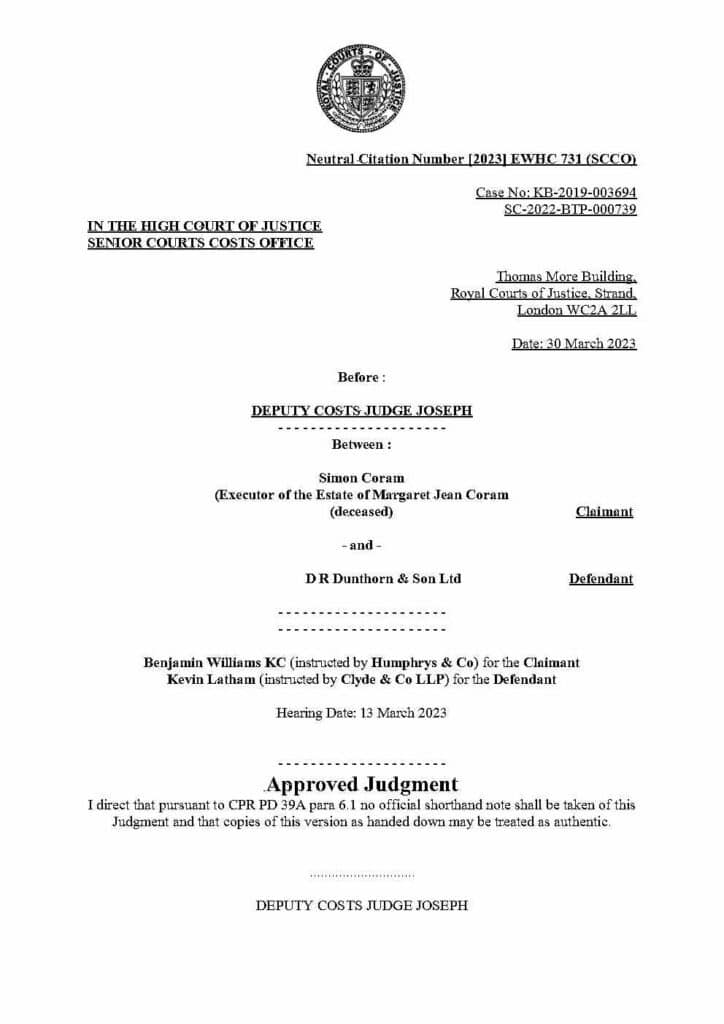The recent case of Coram v D R Dunthorn & Son Ltd [2023] EWHC 731 (SCCO) exemplifies the challenges and limits faced by winning party litigants seeking to recover substantial costs from the losing / paying party after judgment.
In this case, Deputy Costs Judge Joseph determined that the costs incurred for engaging leading counsel to attend a three-day trial were not recoverable from the defendant who was responsible for payment. The case had settled before reaching trial, resulting in the brief fee being reduced.
When evaluating whether the decision to engage leading counsel was reasonable and proportionate, the judge found it to be unreasonable. The primary contributing factor to this conclusion was the absence of any explanation for the perceived necessity of leading counsel in a case with a maximum value of £115,000 (which settled for £75,000).
Our lawyers specialise in litigation and alternative dispute resolution. We will guide you through any stage in your litigation or settlement process. Whether you are a litigant in person seeking legal advice or you have instructed solicitors and are seeking a second opinion on strategy.
Significance of Costs in Civil Litigation
Costs play a pivotal role in civil litigation. Costs refers to the legal fees and court costs and other expenses incurred by litigants throughout the legal process. Having a comprehensive understanding of cost implications is crucial for any party involved in the litigation process. Failing to consider the range of costs outcome aspects can have significant consequences for the overall outcome of a case. For example a Part 36 offer can place significant costs pressure on a litigation opponent. If you feel that your costs position is not being adequately explained in your litigation we offer a fixed fee conference for a second opinion on your litigation matter:
First-class Second Opinions ✔
Discounted fixed fee advice on ADR
Need a second opinion on how your litigation is progressing? Need advice on whether your case is suitable for alternative dispute resolution? Our solicitors & barristers can help by assessing your case prospects- at any stage in your ongoing litigation (or contemplated proceedings). We have dual-qualified lawyers, so if our view is your case has limited merit or high risk we warn you in our first meeting.
Some firms offer free meetings with unqualified or junior lawyers and only after you’ve spent more do you get advice from a senior partner or barrister possibly that the case shouldn’t be pursued. We do things differently from all other law firms in England & Wales. We offer you partner and counsel-led advice in our first meeting, for a heavily discounted fixed fee. That way our best solicitors and barristers can review your case and give you the correct advice at the outset, when it matters the most.
Legal advice is just one aspect of getting a solution. The most important thing is what you do with the legal knowledge about your case, how you present it to the other side and how you negotiate your way to the optimal legal settlement. Our lawyers are masters of strategically securing optimal litigation settlement.
Want your case assessed or a second legal opinion? Call ☎ 02071830529 or message our London lawyers:
Case Study: Costs Recovery in a £115k Claim
In Coram v D R Dunthorn & Son Ltd [2023] EWHC 731 (SCCO) (a £115,000 claim), the winning litigant encountered difficulties in recovering the costs they suffered associated with instructing leading counsel. The court ruled that the litigant could not deploy unlimited resources to fight the case and expect to recover those costs from the opposing party. This decision serves as a stark reminder of the limitations imposed on litigants seeking to recover substantial costs.
The Claimant’s mother had died from mesothelioma related to asbestos exposure while washing her husband’s overalls. The lawsuit was settled for £75,000 before reaching trial . As the costs were below £75,000, the bill underwent a provisional assessment. The defendant argued that engaging Leading Counsel was unnecessary and that the fees charged by counsel were excessive.
The claimant, in this case, had sought to instruct leading counsel to present their claim before the court. However, the court emphasised that while litigants have the right to choose their own legal representation, the recoverable costs incurred must be proportionate and reasonable in relation to the complexity and value of the claim. In this instance, the court deemed that the costs associated with engaging leading counsel were excessive and could not be recovered from the defendant paying party. The judge ruled that the claimant failed to demonstrate the reasonableness and proportionality of instructing leading counsel.
Costs Danger of Deploying Unlimited Resources
It is crucial for litigants to recognise that deploying unlimited financial resources in a legal dispute does not automatically guarantee either success and certainly not full costs recovery.
Courts apply the principle of proportionality to ensure that costs incurred are reasonable and necessary. Excessive or disproportionate spending on legal representation and other expenses may not be recoverable. This principle prevents litigants from deploying unlimited resources to gain an advantage and promotes a level playing field.
Understanding Recoverable and Non-recoverable Costs
To effectively manage costs, it is vital to distinguish between recoverable and non-recoverable expenses. Recoverable costs typically include solicitor’s fees, court fees, expert witness fees, and certain other disbursements directly related to the litigation process. These costs must usually be reasonable and proportionate. Non-recoverable costs may encompass expenses that the court deems excessive, unreasonable, disproportionate or not directly linked to the litigation process. Understanding these distinctions is critical to avoid unnecessary financial burdens during the course of litigation.
Standard Costs vs Indemnity Costs
Standard costs and indemnity costs are two different types of costs that can be awarded by a court in legal proceedings. In England and Wales, the distinction between standard costs and indemnity costs is governed by the Civil Procedure Rules (CPR).
Standard costs, as outlined in CPR Part 44, represent the reasonable and proportionate costs that a successful party can recover. These costs are typically assessed based on a predetermined scale or guideline, taking into consideration factors such as the complexity and value of the case.
Indemnity costs, as specified in CPR Part 44.3, are awarded in exceptional circumstances. These circumstances may include cases where the losing party has acted unreasonably, improperly, or has made a significant offer of settlement that was unreasonably refused. Indemnity costs, which are generally higher than standard costs, aim to provide full compensation to the successful party for their legal expenses.
It is important to note that the court has discretion in determining whether to award standard costs or indemnity costs based on the particular facts and circumstances of each case, as outlined in CPR Part 44.2.
In summary, standard costs are the usual measure of costs awarded to the successful party, while indemnity costs are exceptional and tend to punish some misconduct – they generally result in a higher costs award in specific circumstances (e.g. where the losing party’s behaviour warrants it).
Strategies for Managing Costs in Civil Litigation
Strategic cost management is key for litigants aiming to mitigate financial risks. Here are some essential strategies to consider:
Early cost assessment: Conduct a comprehensive analysis of potential costs at the outset of a case. This evaluation enables the development of a realistic budget and cost management plan.
Alternative dispute resolution (ADR): Explore alternative methods such as mediation or arbitration, which can be more cost-effective and time-efficient than traditional litigation. In fact a refusal to engage in mediation can result in a costs penalty such as costs being awarded on the indemnity basis for the litigant that refuses in this form of ADR.
Budgeting and cost control: Implement a robust budgeting system that includes regular monitoring and control mechanisms. This approach promotes transparency and helps prevent unnecessary expenditure.
Expert advice: Seek guidance from experienced litigation cost lawyers such as ourselves as we can offer valuable insights into cost-saving measures and negotiation strategies.
Download Coram v Dunthorn Judgement:
Instructing our Litigation Lawyers
It is best to instruct solicitors in the early stages of a dispute. Liability for costs is always an issue in litigation and based on our extensive litigation experience we provide our clients with as much strategic, practical as well as carefully considered legal advice in order to ensure minimum risk in respect of costs. Where appropriate we encourage the use of alternative dispute resolution (such as mediation and without prejudice negotiation) and our lawyer’s negotiation skills are first class. If early settlement at advantageous terms is not possible, we are extremely experienced and capable at navigating our clients through the litigation process.
Check Your Litigation Case ✔
We analyse your case prospects. We deliver strategic legal advice at your first fixed fee meeting. We get optimal legal results. Want our opinion on your case? Click below or call our lawyers in London on ☎ 02071830529

